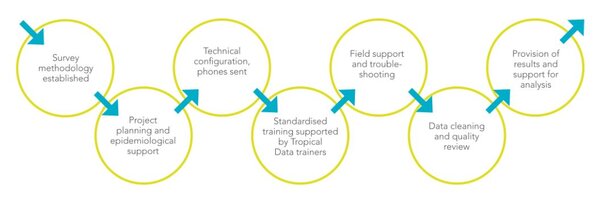Tropical Data – helping to assess the burden of trachoma and other NTDS

LSHTM's Dr Emma Harding-Esch is Chief Scientist for Tropical Data, a partnership that is supporting national programmes to collect scientifically robust and standardised NTD prevalence data. Dr Harding-Esch explains Tropical Data's approach and the impact this is having on NTD control and elimination efforts.
Imagine feeling as though you have needles constantly scratching your eyeball. This is the suffering experienced by people who have trachomatous trichiasis (TT), which is the consequence of trachoma, caused by ocular infection with Chlamydia trachomatis.
Trachoma is the leading infectious cause of blindness worldwide and is targeted for elimination as a public health problem by the year 2020. This is defined as less than 5 in every 100 1–9-year-olds having active (inflammatory) trachoma, and less than 2 in every 1000 adults having TT, in every district in which trachoma used to be a problem. These proportions are referred to by public health specialists as prevalence estimates.
Tropical Data is a service supporting countries to achieve these elimination targets by obtaining standardised, epidemiologically robust population-based prevalence estimates for trachoma. Prevalence estimates not only help to determine whether the elimination targets have been met, but also whether and for how long interventions against trachoma are needed.
The elimination strategy, recommended by the World Health Organization (WHO), is known as “SAFE”:
- Surgery for TT;
- Antibiotics to clear infection (single-dose azithromycin distributed as mass drug administration);
- Facial cleanliness ;
- Environmental improvement to limit infection transmission.
The recommendations are five years of “AFE” where ≥30% of 1-9 year-olds have active trachoma, three years of “AFE” where 10-29.9% of 1-9-year-olds have active trachoma, and one year of “AFE” where 5-9.9% of 1-9-year-olds have active trachoma.
The data that Tropical Data helps generate have direct implications for the prioritisation, initiation, and duration of trachoma elimination interventions, including the distribution of antibiotics to whole districts to treat infection.
Since Tropical Data’s inception in February 2016, it has supported 704 surveys in 28 countries, examining nearly 2.2 million people. The findings of these surveys have enabled countries to bid for and receive nearly 44 million antibiotic treatments donated by Pfizer Inc. These data were also vital in confirming that antibiotics were not needed in 95 districts and could be stopped in 257 districts.
Julie Jenson, Director Corporate Responsibility, Pfizer Inc., recently commented: “Because of Tropical Data, Pfizer can continue to scale-up drug donations. The surveys can also detect and target gaps in funding, further supporting the growth of coverage."
Tropical Data builds on the methods developed within the Global Trachoma Mapping Project (GTMP), for the design and implementation of baseline, impact and surveillance trachoma surveys, as well as TT-only surveys in certain epidemiological contexts.
Tropical Data is a partnership between the International Trachoma Initiative (core data management services), Sightsavers (project management, logistics, budgeting and training support), RTI International(system technology management and Training of Trainers support), World Health Organization (sets standards and protects country interests), and the London School of Hygiene & Tropical Medicine (scientific oversight).
A key aspect of Tropical Data is ministry ownership of the mapping process and data. As such, it is a prime example of successful partnership between governments, donors, NGOs and other implementing partners, WHO, and academic institutions.
Aryc Mosher, Senior Technical Advisor at USAID, notes: “USAID has supported Ministries of Health in conducting 288 trachoma surveys using the Tropical Data platform. Tropical Data’s comprehensive end-to-end support is helping national programs measure progress in the efforts to achieve the elimination of trachoma as a public health problem by 2020."
2020 is only two years away. Currently, 39 countries are suspected to be trachoma-endemic. Five countries have been validated officially as having eliminated trachoma as a public health problem. A number of other countries are anticipated to be validated in 2018, with dossiers from several of those countries relying, at least in part, on data that Tropical Data helped to generate.
The ability to have readily available, epidemiologically robust, globally comparable prevalence estimates is a key tool in making trachoma elimination a tangible reality.
Funding acknowledgements:
Tropical Data is grateful for funding from: World Health Organization, International Trachoma Initiative, The Queen Elizabeth Diamond Jubilee Trust, Sightsavers, United Kingdom’s Department for International Development, the US Agency for International Development and the ENVISION project led by RTI International under cooperative agreement No. AID-OAA-A-11-00048.
The views expressed in this publication are those of the author alone, and do not necessarily reflect the views or policies of the funders or their associated governments.
Further research output
- Dr Emma Harding-Esch profile
- Tropical Data project page
- Diagnostic Accuracy of a Prototype Point-of-Care Test for Ocular Chlamydia trachomatis under Field Conditions in The Gambia and Senegal
- Mass Treatment with Azithromycin for Trachoma: When Is One Round Enough? Results from the PRET Trial in The Gambia
- The impact of a single round of community mass treatment with azithromycin on disease severity and ocular Chlamydia trachomatis load in treatment-naïve trachoma-endemic island communities in West Africa
- Detection of Chlamydia trachomatis in rectal specimens in women and its association with anal intercourse: a systematic review and meta-analysis
- Risk Factors for Active Trachoma and Ocular Chlamydia trachomatis Infection in Treatment-Naïve Trachoma-Hyperendemic Communities of the Bijagós Archipelago, Guinea Bissau
